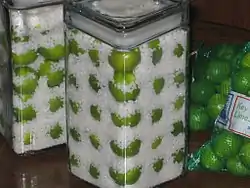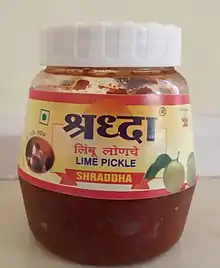Pickled lime
Pickled lime is a food that involves the pickling of limes to preserve them and add flavor.[1][2]

History
In the 19th and early 20th centuries, pickled limes were exported from the West Indies to areas in the Northeastern United States.[1] In the mid-19th century, pickled limes were in demand in New York, and by the late 19th century they were mostly exported to Boston.[1] During this time period, stores would display them in glass jars atop counters and sell them by the piece.[1] Some customers purchased entire barrels of them at a time.[1]
During the mid-19th century, pickled Key limes were exported from Florida to Boston.[2]
Recipe
Pickled limes, as known in 19th century New England and as consumed by the fictional character Amy in the novel Little Women by Louisa May Alcott, were key limes cut into chunks, submerged in brine and allowed to cure for three to four weeks. The importers successfully kept them classified at the lowest import tax rate, making it possible for retailers to sell them for a penny. This made them readily available to children, who commonly carried them to school.[1]
Usage

Pickled limes are sometimes eaten alone, as a snack.[1] They are also an ingredient in the preparation of some sweet relishes.[1]
Lime is an essential ingredient of many cuisines from India, and many varieties of pickles are made, e.g. sweetened lime pickle, salted pickle, and lime chutney. Preparation depends on region, but the principle remains largely the same: limes are diced, mixed with varying spices such as mustard seed, chili, and turmeric, then tossed with salt and left, covered, in the sun for several weeks.
In the United Kingdom, Indian restaurants often serve papadums with lime pickle as a starter.
See also
- List of fermented foods – Wikipedia list article
- List of pickled foods – List of links to Wikipedia articles on pickled foods
- Pickled fruit – Fruit that has been preserved by anaerobic fermentation in brine or immersion in vinegar
- Preserved lemon – Type of pickle
